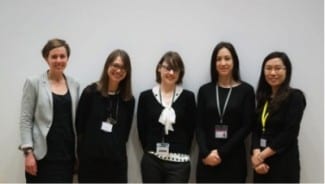Get your career going: a conference for early career researchers
By ucyow3c, on 22 February 2015
![]() Written by Dr Sonali Wayal, Research Associate, UCL Centre for Sexual Health and HIV Research
Written by Dr Sonali Wayal, Research Associate, UCL Centre for Sexual Health and HIV Research

The Early Career Forum’s Conference organising committee
UCL Institute of Epidemiology and Health Care’s Early Career Forum held its ‘Get your career going’ one-day conference on 19 February 2015. It was attended by PhD students and early career researchers from UCL Population Health Sciences.
The morning kicked off with coffee, pastries, and networking. “I wish I was advised about the importance of acquiring skills beyond just the PhD” was the inaugural sentiment of Professor Robert Miller, who chaired the conference. The conference was tailored to provide insights into how to advance your career both inside and outside of academia.
The first presenter, Dr Fiona Stevenson, gave a talk on ‘Teaching in Higher Education’. Her top tips for becoming a lecturer were to acquire a breadth of teaching experience which could involve giving lectures, developing course materials or doing small group teaching or tutoring. Proactively seeking teaching opportunities by contacting course administrators about your specialist skills or setting up new courses can be one way of getting such experience.
Following this, Professor Robert Miller, in his talk ‘Getting Your Paper Published’, emphasised the significance of choosing an appropriate journal to publish your study results by understanding the target audience, the content/focus of your research, the journal’s impact factor and the rejection rates of journals. Making pragmatic decisions based on the best audience for your work and the likelihood of your paper being accepted is important.
Reading instructions for authors, adapting the journal’s ‘style’, not exceeding the journal’s word limit, referencing your papers that are in press, and responding to all reviewers’ comments are also important in avoiding rejection. Lastly, he emphasised that “the cover letter is your only chance to catch the eye of the editor” so use it to tell them why they should read and publish the paper and how their journal and its readers may benefit from it!
Practical insights into how to get your research funded were provided by Professor Caroline Sabine in her talk ‘Getting your research funded’. Her top tips for making sure a grant application is successful were: starting by getting small grants (from charities and pharmaceutical industry) to enhance your CV; being a named co-applicant on other people’s grants; building your publication list; giving presentations; and building a broad area of expertise and then honing down on a specialist area.
She also stressed the importance of being realistic, assertive, having a clear hypothesis, proposing to use appropriate methods, getting someone else to read your application and avoiding inappropriate costing. As with all applications, it’s important to remember to check the eligibility criteria and application deadline carefully early on!
Dr Sophia Donaldson from UCL Careers spoke on ‘Identifying and selling your transferable skills’ and highlighted that nowadays staying in academia is an exception rather than the rule. Common alternative career pathways are: working with research funders; programme management; working in government or the public sector; or working within the commercial sector. However, unlike in academia, soft skills like project management and commercial awareness are more important than publications.
Her top tips were to remember that “job descriptions are your friends” when applying for a job, knowing your target audience and tailoring your application accordingly. This is vital because an employer spends on an average six seconds skimming through your CV and then 60-90 seconds reading if it’s interesting!
Insights into the implications of research for policy were given by Professor Sir Michael Marmot who shared his personal experiences in his talk ‘Getting into policy’. He emphasised the policy implications that scientific research can have if it is communicated effectively. Nonetheless, translating research into policy is a journey during which he learned that “first you form, followed by a storm, then it becomes a norm, and then you perform!”.
He flagged the need to remain close to the evidence, not the politics, and to speak from the heart. In this process it is also important to remember that science can have multiple contradictory perspectives, whereas policy makers have to make a definitive choice.
The day ended with Dr Peter Border from the Parliamentary Office of Science and Technology (POST) talking about opportunities for working with governmental organisations. POST publishes balanced, independent and comprehensive notes on various issues in an accessible language. It offers fellowship students opportunities to work with them on various issues. Often, research councils and funders support PhD students to work within Parliament with a Select committee or library for short period.
Throughout the day, these presentations generated substantial interaction between the presenters and attendees, as well as on Twitter. Overall, this conference offered an excellent platform for early career researchers to hear some top tips from distinguished and experienced people on how to get your career going!
 Close
Close

